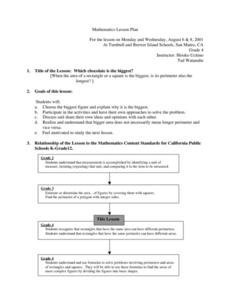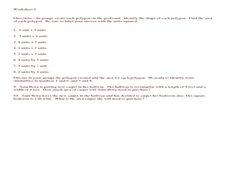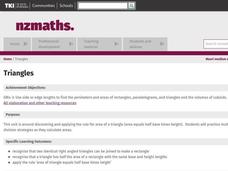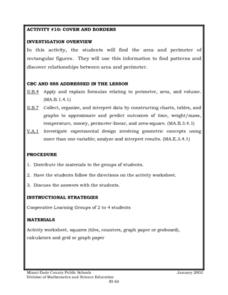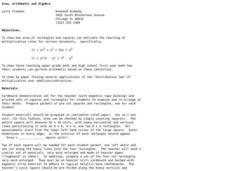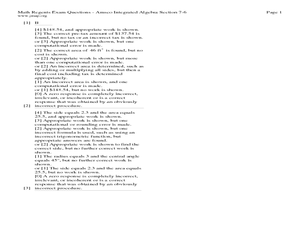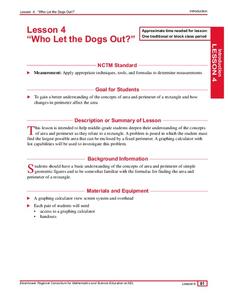Curated OER
Areas and Perimeters
Students practice together measuring the lengths of the sides of various shapes as well as how to change units into other measuring formats. Individually they work on several word problems involving areas and perimeters. Formulating the...
Alabama Learning Exchange
Polygon Perimeters
What are polygons? Learners find the perimeter of various geometric figures that the teacher has drawn in chalk on the sidewalk. A worksheet to record their measurements is provided. Get your third graders outside and exploring the world...
Curated OER
Which Chocolate Is The Biggest?
Learners investigate the concepts of area and perimeter with the use of chocolate bars. They calculate the perimeter and area of different size rectangle chocolate bars and record the statistics. Then students make a visual comparison...
Curated OER
How Many Units?
Young mathematicians calculate the area of rectangles and squares. In this geometry lesson, learners are grouped in pairs and use geoboards to construct rectangles. They calculate the area of the figure by counting the number of square...
Curated OER
Triangles
This unit enables scholars to apply the rule for area of a triangle (area equals half base times height). They practice multiplication and division strategies as they calculate areas.
Curated OER
Investigation-Looking at Polygons
Eighth graders plot points and investigate polygons. They locate a point, using ordered pairs of integers on the coordinate plane. Students compare geometric measurements and computations on coordinate axes as they are applied to...
Curated OER
Can You Build It?
Students investigate the concept of perimeter. They design there own figure and measure the perimeter of it. The lesson is given the context of the shape being a path that is traveled by a ladybug. This provides the shape of the plane...
Curated OER
Pacing a Gunther Chain
Students pace a Gunther Chain, a measurement used by foresters to determine distance and area. They discuss that pacing is individualized depending on age, gender, etc. They practice to find an average pace. Teams estimate, pace and...
Curated OER
ExplorA-Pond: 4th Grade Perimeter Estimation
Your geometers are used to finding the perimeter of a square or rectangle, so give them something different this time! With this instructional activity, small groups will receive a picture of a shoreline and calculate the perimeter. The...
Curated OER
Connecting Formulas Related to Geometric Figures
Young scholars identify diagrams of quadrilaterals and circles by different names and classify the figures. They name the areas for each diagram and practice solving the formulas for each.
Curated OER
Cover and Boarders
Students find the area and perimeter of rectangular figures. They use this information to find patterns and discover relationships between area and perimeter. Students apply and explain formulas relating to perimeter, area, and volume.
Curated OER
Shapes and Their Insides
Learners follow a series of instructions for drawing and coloring different shapes in order to learn the difference between the perimeter and area of a polygon. Then they are asked to find the perimeter and area of a 3x4 rectangular...
Curated OER
Area, Arithmetic and Algebra
Explore the concept of this perfect square trinomial and difference of squares lesson. A hands-on activity that uses paper rectangles and squares to illustrate the perfect-square trinomial and difference of squares formulas.
Curated OER
Finding Patterns in Tiles
Students explore perimeter and area of rectangles. In this rectangular lesson, students use tiles to discover the formulas for perimeter and area. Students solve for area.
Curated OER
Area of irregular Polygons: Historical Motivator - Lewis and Clark Adventure
Seventh graders find the area of irregular polygons. In this lesson on calculating area, 7th graders use the adventures of Lewis and Clark as motivation to learn how to calculate the area of irregular polygons.
Cord Online
Pyramids and Cones
Young mathematicians find the surface area and volume of a square pyramid and a cone. In what looks like a typical activity out of a textbook, you'll find an activity where learners find an unknown measurement of a pyramid or...
Curated OER
Tiling Tessellations
Learners explore tessellations. In this shapes and geometry lesson, students describe the attributes of many of the shapes displayed on an Elmo. Learners create examples of tessellations using pattern blocks.
Teachers Network
A World of Symmetry: Math-Geometry
Define and identify the three basic forms of symmetry translation, rotation, and glides with your class. They cut out and arrange paper pattern blocks to illustrate symmetry, create a Cartesian graph, and design a rug with a symmetrical...
Curated OER
Area and Measurements
Young scholars measure the area using feet and yard. In this algebra lesson, students draw and manipulate shapes to calculate the area. They measure the relationship of area between the two units.
Curated OER
Area of Irregular Polygons
In this geometry worksheet, 10th graders determine the area of irregular polygons. The one page worksheet contains three problems. Solutions are provided.
Curated OER
Who Let the Dogs Out?
Students examine the concepts of area and perimeter and how they relate to a rectangle. They find the largest possible area that can be enclosed by a fixed perimeter and complete a worksheet as well as create a table of all the possible...
Curated OER
Peter's Second String
Fifth graders determine the maximum area and range of areas of a rectangle with a given perimeter. They discuss a word problem involving perimeter and area as a class, investigate the word problem using a piece of string, and in small...
Curated OER
Flip's Flag
Fifth graders apply the symmetry and angle properties of polygons and use fractions to express the relationships between the areas of rectangles, squares, and triangles. They analyze various country flags and develop mathematical...
Curated OER
Cylinder: Student Worksheet
In this cylinder worksheet, young scholars compare three different cylinders to experiment which one has the greatest volume. Students interact with rectangles as they experiment with the cylinders.


